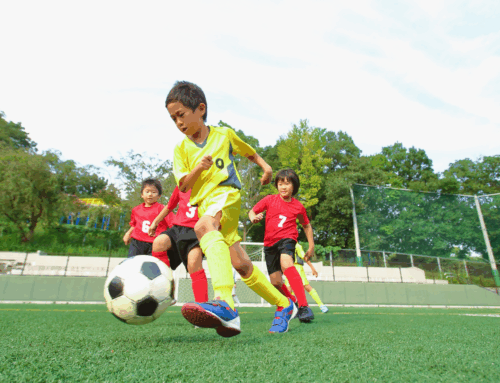Get our exclusive report. Download the iSport360 Club Switching Report Here – For Club Admins, Rec Leaders and Coaches.
Tips to Foster Leadership on Your Team
Leadership is a vital component of any successful sports team. Whether it’s on the field, in the locker room, or within the community, strong leaders can inspire, motivate, and unite their teammates toward a common goal. As coaches, parents, and mentors, it’s our responsibility to cultivate leadership skills in our young athletes and empower them to become positive influencers both on and off the field. Here are some effective tips to help create leaders on your team:
Lead by Example:
As a coach or authority figure, you set the tone for your team’s culture and behavior. Lead by example by demonstrating the values and qualities you wish to instill in your athletes, such as integrity, work ethic, and resilience. Show them what it means to be a leader through your actions, both on and off the field.
Encourage Communication:
Communication is key to effective leadership. Encourage open and honest communication among teammates, coaches, and staff members. Provide opportunities for athletes to express their thoughts, opinions, and concerns, and foster a culture of respect and collaboration where everyone’s voice is valued.
Develop Self-Awareness:
Help athletes develop self-awareness by encouraging them to reflect on their strengths, weaknesses, and areas for growth. Prompt them to identify their leadership style and the impact they have on their teammates. Self-awareness lays the foundation for personal growth and leadership development.
Set Clear Expectations:
Clearly define the roles and responsibilities of team leaders, and communicate your expectations to all athletes. Encourage leaders to lead by example, inspire their teammates, and uphold team values and standards. Providing clarity and guidance empowers athletes to step into leadership roles with confidence and purpose.
Empower Decision-Making:
Empower athletes to take ownership of their actions and decisions both on and off the field. Encourage them to problem-solve, think critically, and make decisions that benefit the team as a whole. By giving athletes autonomy and responsibility, you foster leadership skills and accountability.
Provide Leadership Opportunities:
Create opportunities for athletes to take on leadership roles and responsibilities within the team. Assign tasks such as leading warm-up drills, organizing team events, or mentoring younger teammates. These experiences allow athletes to develop leadership skills in a supportive and controlled environment.
Promote Team Building:
Foster a sense of camaraderie and unity among teammates through team-building activities and exercises. Encourage collaboration, trust, and communication among athletes, and provide opportunities for them to bond both on and off the field. A strong team bond lays the foundation for effective leadership and collective success.
Encourage Mentorship:
Foster a culture of mentorship within your team, where older or more experienced athletes mentor and support their younger counterparts. Pair athletes together based on shared interests, goals, or strengths, and encourage them to learn from each other. Mentorship not only benefits the mentee but also strengthens the leadership skills of the mentor.
Celebrate Leadership:
Recognize and celebrate acts of leadership and sportsmanship, both on and off the field. Highlight examples of athletes demonstrating leadership qualities such as integrity, humility, and empathy. By acknowledging and celebrating leadership, you reinforce its importance and inspire other athletes to follow suit.
Provide Leadership Training:
Offer leadership training and development opportunities for athletes to enhance their skills and knowledge. This could include workshops, seminars, or guest speakers focused on topics such as communication, conflict resolution, and emotional intelligence. Investing in leadership development empowers athletes to become more effective leaders on and off the field.
Encourage Growth Mindset:
Foster a growth mindset within your team, where athletes embrace challenges, learn from failures, and continuously strive for improvement. Encourage athletes to view setbacks as learning opportunities and to seek feedback as a means of personal and professional growth. A growth mindset fosters resilience and adaptability, key traits of effective leaders.
Lead with Empathy and Compassion:
Encourage leaders to lead with empathy and compassion, understanding the perspectives and feelings of their teammates. Encourage them to listen actively, offer support, and create a safe and inclusive environment where all athletes feel valued and respected. Leading with empathy builds trust and strengthens team cohesion.
In conclusion, cultivating leadership on your team is a collaborative effort that requires intention, dedication, and support from coaches, parents, and athletes alike. By leading by example, promoting communication, developing self-awareness, and providing opportunities for growth and mentorship, you can empower your athletes to become confident, compassionate, and effective leaders both on and off the field. Together, we can cultivate a culture of leadership that fosters personal growth, collective success, and positive impact within our teams and communities.
iSport360 is the only app that does it all for youth sports. For more information on what we do, click here.
About the author:
Amy Masters is a sports mom, coach, and club administrator. She has been coaching youth sports for more than 10 years. She started Jr Lions Field Hockey, the youth recreation program for the Hunterdon County community growing it from 40 players in year 1 to 150 players by year 3. A few years later, she saw the love and competitiveness grow then started Omega Field Hockey Club serving NJ and PA players. Before coaching, she was a collegiate field hockey player for Lock Haven University. In her spare time (lol), she is head of marketing for iSport360 and the co-editor of the Youth Sports Survival Guide. The Youth Sports Survival Guide is the largest youth sports newsletter in the world.
Learn more or request a demo of our youth sports software that is helping teams improve communication, organization and player development.
July 5, 2024





